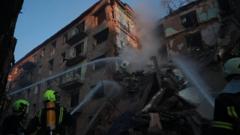*Recent hostilities have escalated between Iran and Israel, amplifying international concerns about potential widespread conflict in the Middle East.*
**Escalation in Middle East: Military Strikes Intensify as Iran Prepares to Respond**

**Escalation in Middle East: Military Strikes Intensify as Iran Prepares to Respond**
*In a rapidly deteriorating situation, U.S. and Israeli military actions against Iranian targets trigger fears of retaliation, particularly aimed at American forces in Qatar.*
The conflict between Israel and Iran has reached alarming new heights as Israel launches extensive strikes against Iranian targets, including key military sites and detention facilities. The latest series of assaults occurred just days after the United States carried out attacks on Iran's nuclear sites. Israeli officials have communicated their intent to continue these strikes, signaling that this is far from the end of military actions in the region.
On June 23, 2025, Israel conducted bombings in Tehran, specifically targeting the notorious Evin Prison, recognized for housing political prisoners and dissenters, alongside a paramilitary headquarters used by Iran's Islamic Revolutionary Guard Corps (IRGC). As residents flee to shelters in response to air raid alarms, both nations find themselves caught in a dangerous cycle of retaliation.
Alarmingly, Iranian and Israeli officials have indicated that Iran may retaliate against the U.S. Central Command's al-Udeid Air Base located in Qatar, amplifying concerns that the conflict could draw in American forces. A senior White House official acknowledged the heightened threats against the base, prompting warnings for Americans in Qatar to remain sheltered.
In the wake of these attacks, Iran has vowed to respond decisively, though the exact nature of its retaliation remains to be seen. While Iranian Foreign Minister Abbas Araghchi met with Russian President Vladimir Putin, who condemned U.S. actions as "unprovoked aggression," the Iranian regime has yet to reveal its detailed strategic response. Notably, Ayatollah Ali Khamenei has remained silent following the U.S. strikes, creating uncertainty about Iran's next course of action.
Despite these tensions, economic markets show cautious optimism, with traders monitoring how far the conflict will escalate, particularly its implications for oil shipments through the crucial Strait of Hormuz. The European Union's diplomatic leaders have also urged both sides to restrain their actions and seek diplomatic paths to mitigate the conflict's reach.
Military analysts emphasize that Iran, while strategically weakened, retains potent operational capabilities, leaving potential for rapid and severe retaliation against U.S. interests, with missile threats looming large. As the risk of further escalations grows, the international community watches closely, hoping for a restrained and diplomatic resolution rather than a pervasive military confrontation that could destabilize the entire region.
In summary, the situation is precarious, with Israel continuing its military campaign, Iran gauging its response, and both sides embroiled in fears of escalation that could have far-reaching consequences for the Middle East and beyond.
On June 23, 2025, Israel conducted bombings in Tehran, specifically targeting the notorious Evin Prison, recognized for housing political prisoners and dissenters, alongside a paramilitary headquarters used by Iran's Islamic Revolutionary Guard Corps (IRGC). As residents flee to shelters in response to air raid alarms, both nations find themselves caught in a dangerous cycle of retaliation.
Alarmingly, Iranian and Israeli officials have indicated that Iran may retaliate against the U.S. Central Command's al-Udeid Air Base located in Qatar, amplifying concerns that the conflict could draw in American forces. A senior White House official acknowledged the heightened threats against the base, prompting warnings for Americans in Qatar to remain sheltered.
In the wake of these attacks, Iran has vowed to respond decisively, though the exact nature of its retaliation remains to be seen. While Iranian Foreign Minister Abbas Araghchi met with Russian President Vladimir Putin, who condemned U.S. actions as "unprovoked aggression," the Iranian regime has yet to reveal its detailed strategic response. Notably, Ayatollah Ali Khamenei has remained silent following the U.S. strikes, creating uncertainty about Iran's next course of action.
Despite these tensions, economic markets show cautious optimism, with traders monitoring how far the conflict will escalate, particularly its implications for oil shipments through the crucial Strait of Hormuz. The European Union's diplomatic leaders have also urged both sides to restrain their actions and seek diplomatic paths to mitigate the conflict's reach.
Military analysts emphasize that Iran, while strategically weakened, retains potent operational capabilities, leaving potential for rapid and severe retaliation against U.S. interests, with missile threats looming large. As the risk of further escalations grows, the international community watches closely, hoping for a restrained and diplomatic resolution rather than a pervasive military confrontation that could destabilize the entire region.
In summary, the situation is precarious, with Israel continuing its military campaign, Iran gauging its response, and both sides embroiled in fears of escalation that could have far-reaching consequences for the Middle East and beyond.























